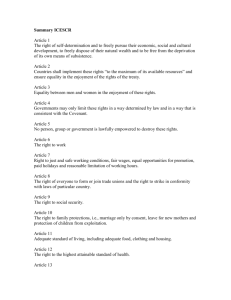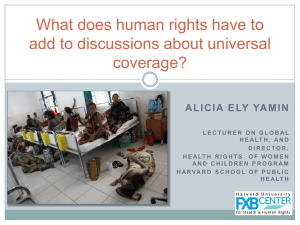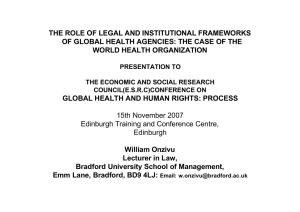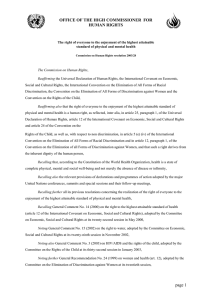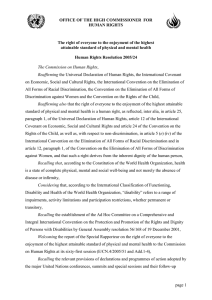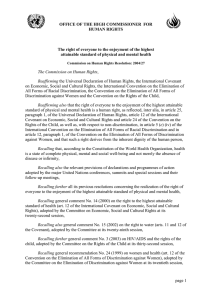OFFICE OF THE HIGH COMMISSIONER FOR HUMAN RIGHTS
advertisement
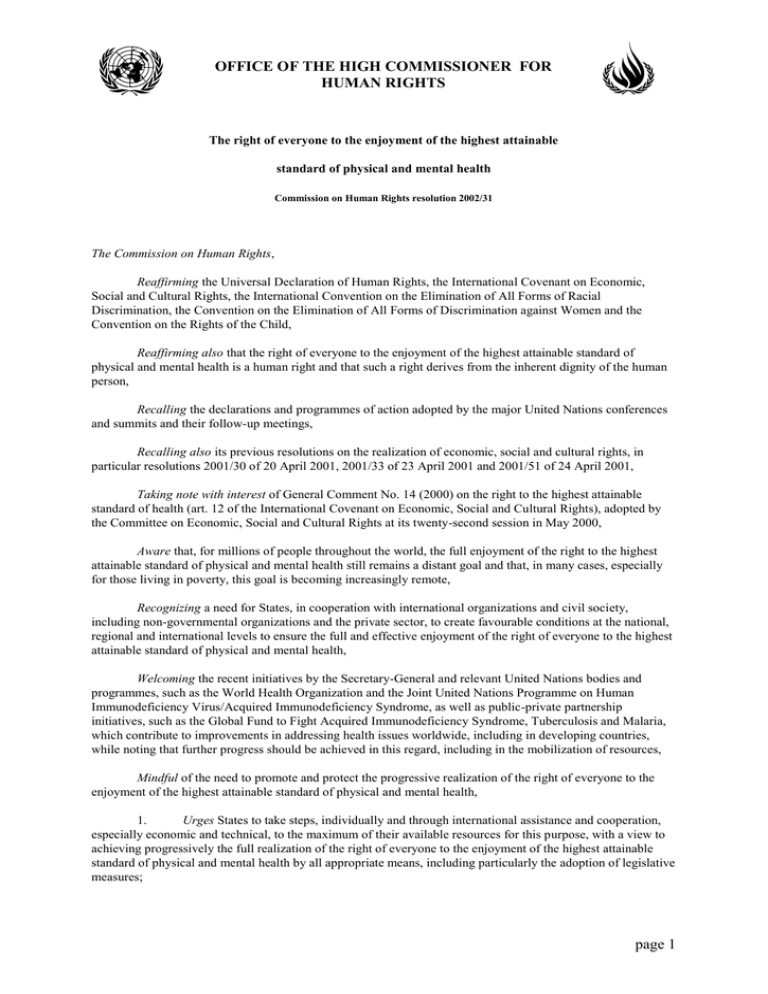
OFFICE OF THE HIGH COMMISSIONER FOR HUMAN RIGHTS The right of everyone to the enjoyment of the highest attainable standard of physical and mental health Commission on Human Rights resolution 2002/31 The Commission on Human Rights, Reaffirming the Universal Declaration of Human Rights, the International Covenant on Economic, Social and Cultural Rights, the International Convention on the Elimination of All Forms of Racial Discrimination, the Convention on the Elimination of All Forms of Discrimination against Women and the Convention on the Rights of the Child, Reaffirming also that the right of everyone to the enjoyment of the highest attainable standard of physical and mental health is a human right and that such a right derives from the inherent dignity of the human person, Recalling the declarations and programmes of action adopted by the major United Nations conferences and summits and their follow-up meetings, Recalling also its previous resolutions on the realization of economic, social and cultural rights, in particular resolutions 2001/30 of 20 April 2001, 2001/33 of 23 April 2001 and 2001/51 of 24 April 2001, Taking note with interest of General Comment No. 14 (2000) on the right to the highest attainable standard of health (art. 12 of the International Covenant on Economic, Social and Cultural Rights), adopted by the Committee on Economic, Social and Cultural Rights at its twenty-second session in May 2000, Aware that, for millions of people throughout the world, the full enjoyment of the right to the highest attainable standard of physical and mental health still remains a distant goal and that, in many cases, especially for those living in poverty, this goal is becoming increasingly remote, Recognizing a need for States, in cooperation with international organizations and civil society, including non-governmental organizations and the private sector, to create favourable conditions at the national, regional and international levels to ensure the full and effective enjoyment of the right of everyone to the highest attainable standard of physical and mental health, Welcoming the recent initiatives by the Secretary-General and relevant United Nations bodies and programmes, such as the World Health Organization and the Joint United Nations Programme on Human Immunodeficiency Virus/Acquired Immunodeficiency Syndrome, as well as public-private partnership initiatives, such as the Global Fund to Fight Acquired Immunodeficiency Syndrome, Tuberculosis and Malaria, which contribute to improvements in addressing health issues worldwide, including in developing countries, while noting that further progress should be achieved in this regard, including in the mobilization of resources, Mindful of the need to promote and protect the progressive realization of the right of everyone to the enjoyment of the highest attainable standard of physical and mental health, 1. Urges States to take steps, individually and through international assistance and cooperation, especially economic and technical, to the maximum of their available resources for this purpose, with a view to achieving progressively the full realization of the right of everyone to the enjoyment of the highest attainable standard of physical and mental health by all appropriate means, including particularly the adoption of legislative measures; page 1 2. Calls upon the international community to continue to assist the developing countries in promoting the full realization of the right of everyone to the enjoyment of the highest attainable standard of physical and mental health, including through financial and technical support as well as training of personnel, while recognizing that the primary responsibility for promoting and protecting all human rights rests with States; 3. Calls upon States to guarantee that the right of everyone to the enjoyment of the highest attainable standard of physical and mental health will be exercised without discrimination of any kind; 4. Decides to appoint, for a period of three years, a special rapporteur whose mandate will focus on the right of everyone to the enjoyment of the highest attainable standard of physical and mental health, as reflected in article 25, paragraph 1, of the Universal Declaration of Human Rights, article 12 of the International Covenant on Economic, Social and Cultural Rights, article 24 of the Convention on the Rights of the Child and article 12 of the Convention on the Elimination of All Forms of Discrimination against Women, as well as on the right to non-discrimination as reflected in article 5 (e) (iv) of the International Convention on the Elimination of All Forms of Racial Discrimination; 5. Requests the Special Rapporteur: (a) To gather, request, receive and exchange information from all relevant sources, including Governments, intergovernmental organizations and non-governmental organizations, on the realization of the right of everyone to the enjoyment of the highest attainable standard of physical and mental health; (b) To develop a regular dialogue and discuss possible areas of cooperation with all relevant actors, including Governments, relevant United Nations bodies, specialized agencies and programmes, in particular the World Health Organization and the Joint United Nations Programme on Human Immunodeficiency Virus/Acquired Immunodeficiency Syndrome, as well as non-governmental organizations and international financial institutions; (c) To report on the status, throughout the world, of the realization of the right of everyone to the enjoyment of the highest attainable standard of physical and mental health, in accordance with the provisions of the instruments listed in paragraph 4 above, and on developments relating to this right, including on laws, policies and good practices most beneficial to its enjoyment and obstacles encountered domestically and internationally to its implementation; (d) To make recommendations on appropriate measures to promote and protect the realization of the right of everyone to the enjoyment of the highest attainable standard of physical and mental health, with a view to supporting States’ efforts to enhance public health; 6. Requests the Special Rapporteur to avoid in her or his work any duplication or overlapping with the work, competence and mandate of other international bodies active in health issues; 7. Invites the Special Rapporteur to apply a gender perspective in her or his work and to pay special attention to the needs of children in the realization of the right of everyone to the enjoyment of the highest attainable standard of physical and mental health; 8. Also invites the Special Rapporteur to take into account in her or his work the relevant provisions of the Durban Declaration and Programme of Action, adopted in September 2001 by the World Conference against Racism, Racial Discrimination, Xenophobia and Related Intolerance (A/CONF.189/12), as well as of the declarations and programmes of action adopted by the major United Nations conferences and summits and their follow-up meetings, and to bear in mind General Comment No. 14 (2000) of the Committee on Economic, Social and Cultural Rights and General Recommendation No. 24 of the Committee on the Elimination of Discrimination against Women, adopted at its twentieth session, as well as any other general comment that treaty bodies adopt on related provisions of relevant instruments; 9. Requests the United Nations High Commissioner for Human Rights to provide all the necessary resources for the effective fulfilment of the Special Rapporteur’s mandate from within existing resources; page 2 10. Calls upon Governments to cooperate fully with the Special Rapporteur in the implementation of her or his mandate, to provide all information requested and to respond promptly to her or his communications; 11. Requests the Special Rapporteur to submit an annual report to the Commission on the activities performed under her or his mandate; 12. Decides to continue consideration of this matter at its fifty-ninth session under the same agenda item. 49th meeting 22 April 2002 [Adopted without a vote. E/2002/23- E/CN.4/2002/200, see chap. X.] page 3
